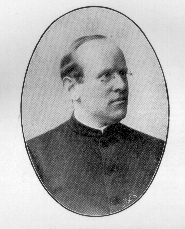Carl Braig
Carl Braig (born February 10, 1852 in Kanzach , † March 24, 1923 in Freiburg im Breisgau ) was a German Catholic priest , theologian and philosopher .
Life
Braig began studying philosophy in Tübingen in 1873, which he completed in 1877. In 1878 he was ordained a priest and from 1883 to 1893 he was city pastor in Wildbad near Karlsruhe. In 1887/88 a study trip to Paris and Toulouse followed. In 1889 he earned a doctorate in theology in Freiburg im Breisgau. From 1893 he was a regular honorary professor for the philosophical-theological disciplines of propaedeutic theology. In 1897 he became a full professor for dogmatics in Freiburg. In 1907/08 he was Vice Rector of the University of Freiburg . In 1919 he retired.
Carl Braig was a philosophical-apologetic oriented theologian who was oriented towards Gottfried Wilhelm Leibniz and Rudolf Hermann Lotze . He rejected the psychologism that was in swing at the time , as well as the philosophy of subjectivity .
reception
Braig exerted a deep influence with his work “Vom Sein. Abriß der Ontologie ” (1896) on Martin Heidegger , who read the work in the senior year and in the 3rd and 4th university semesters Braig's dogmatic introductions to the doctrine of God and theological cosmology and also later attended his dogmatic introductory courses. Heidegger, who with Being and Time strongly criticized an ontology based purely on presence , owes Braig fundamental suggestions in this regard. Braig already provides the distinction, which later shaped Heidegger, between the “philosophical consciousness” of time and the “common consciousness”, which the latter “personifies time as a shadowy thing [...]”. Braig also emphasizes the “ontological meaning of the concept of time”. Braig also introduced Heidegger to the historically oriented idealism of Hegel.
Publication (selection)
- The future religion of the unconscious and the problem of subjectivism: an apologetic attempt. Freiburg 1882. - 334 pp. - Against Eduard von Hartmann
- The Art of Mind Reading: A Counterpart to Spiritism . Frankfurt 1886
- The Freedom of Philosophical Research in a Critical and Christian Version: An Inaugural Academic Address. (held June 5, 1894). Freiburg 1894. - 64 pp.
-
Fundamentals of Philosophy (the planned volumes 1: Propaedeutics; 5: Physics; 6: Psychophysics; 7: Psychology; 8: Ethics; 9: Aesthetics; 10: Philosophical theology) - digital version
- Volume 2: Of Thinking: Outline of Logic . Freiburg 1896. - 141 pp.
- Volume 4: Of Being: Outline of Ontology . Freiburg 1896. - 158 pp.
- Volume 3: On Knowledge: Outline of Noetics . Freiburg 1897. - 255 pp.
- The essence of Christianity is explained using an example, or Adolf Harnack and the idea of the Messiah . Freiburg 1903. - 40 pp.
- Most Modern Christianity and Modern Religious Psychology: Two Academic Theses . Freiburg 1906. - 2nd edition 1907. - 150 pp.
- The dogma of recent Christianity . Speech given at the celebration of the handover of the Protectorate on May 15, 1907
- Outline of Christology . Printed as a manuscript. Freiburg 1907. - 207 pp.
- Modernism and the freedom of science . Freiburg 1911. - 58 pp.
- The doctrine of God . Printed as a manuscript. Freiburg 1912. - 151 pp.
literature
- Daniel Esch: Apostolate of the Dialectic. Life and work of the Freiburg theologian and philosopher Carl Braig (1853-1923) . Diss. Theol. Freiburg 2004. - Book edition: Freiburg: Rombach, 2004 (Freiburg dissertation series; 1). - ISBN 3-7930-5001-7 . - Digital version
- Martin Heidegger: On the matter of thinking . Tübingen 1969, p. 91f.
- Johannes Schaber: Braig, Carl. In: Biographisch-Bibliographisches Kirchenlexikon (BBKL). Volume 14, Bautz, Herzberg 1998, ISBN 3-88309-073-5 , Sp. 820-829.
Web links
- Literature by and about Carl Braig in the catalog of the German National Library
- Bibliography by Carl Braig
- Carl Braig page of the Freiburg University Library
Individual evidence
- ↑ Heidegger, On the matter of thinking , pp. 81f .; s. also Heidegger: Early writings 11, GA 1, p. 57; Thomas Sheehan: Heidegger's Apprenticeship Years ( Memento from September 8, 2013 in the Internet Archive ) . In: John Sallis et al. (Ed.): The Collegium Phaenomenologicum . Kluwer, Dordrecht / Boston / London 1988, pp. 77-137, here pp. 94f.
- ↑ Carl Braig: From being. Outline of the ontology. , § 19.
- ↑ Ibid. § 21.
- ↑ Sheehan, op. OS 97.
| personal data | |
|---|---|
| SURNAME | Braig, Carl |
| BRIEF DESCRIPTION | German Catholic theologian and philosopher |
| DATE OF BIRTH | February 10, 1852 |
| PLACE OF BIRTH | Kanzach |
| DATE OF DEATH | March 24, 1923 |
| Place of death | Freiburg in Breisgau |
